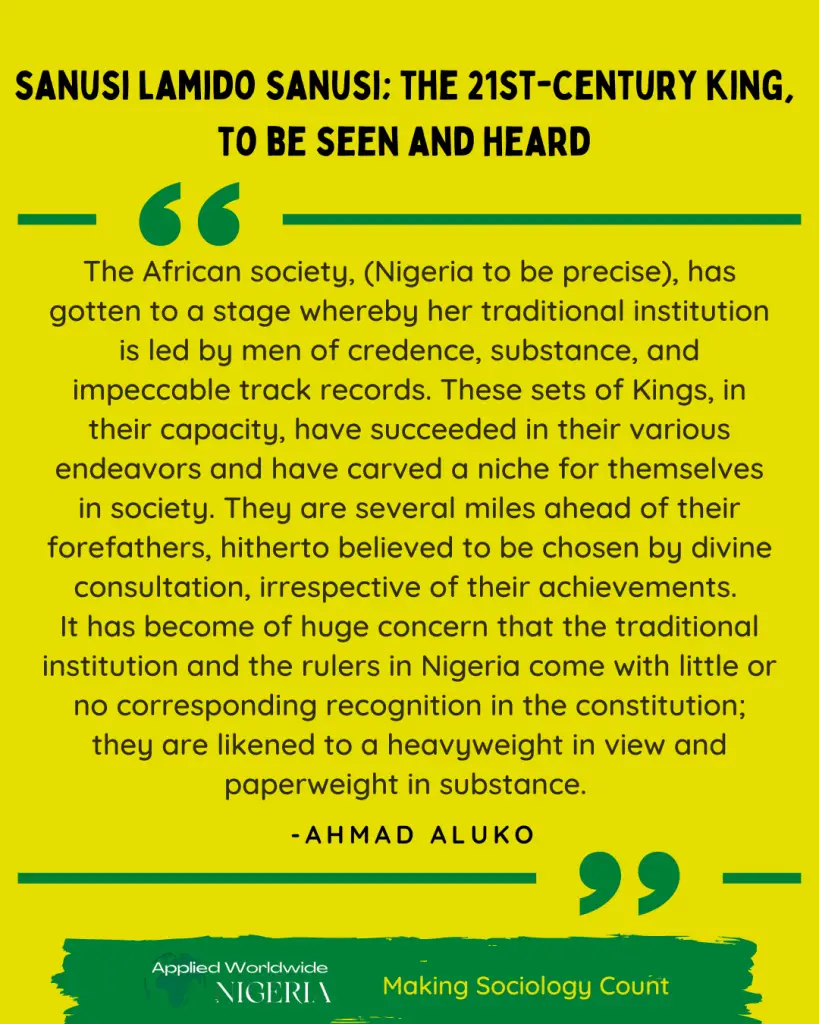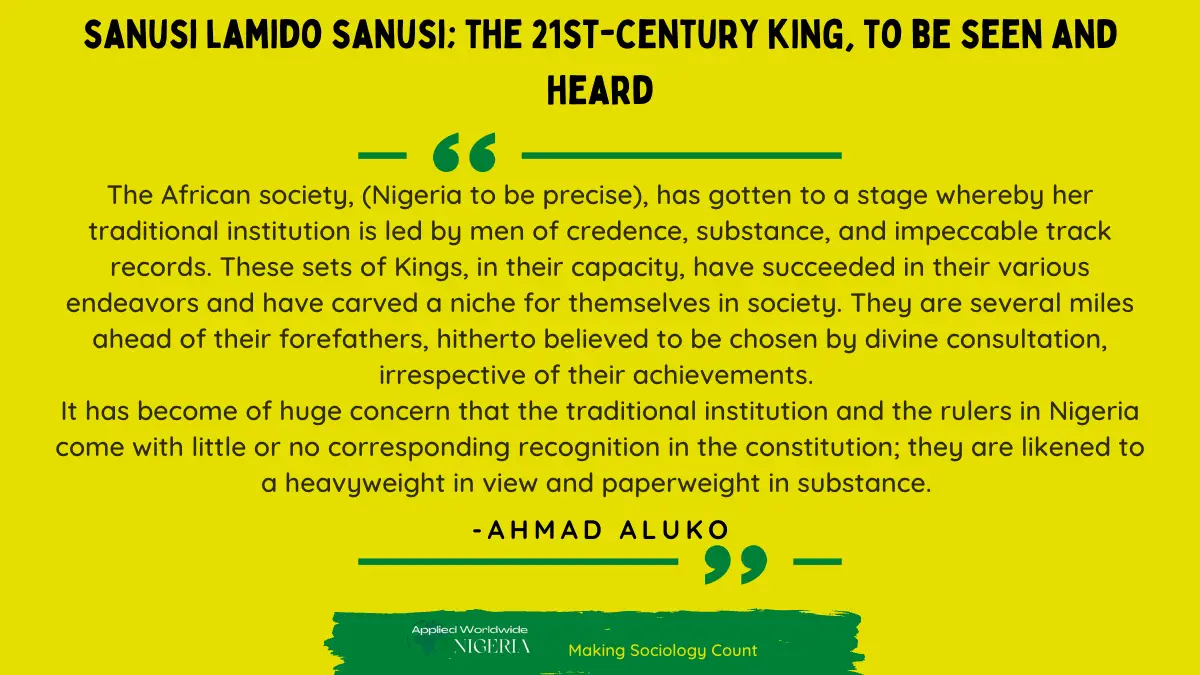The African society, (Nigeria to be precise), has gotten to a stage whereby her traditional institution is led by men of credence, substance, and impeccable track records. These sets of Kings, (to which Sanusi Lamido Sanusi belongs), in their capacity, have succeeded in their various endeavors and have carved a niche for themselves in society. They are several miles ahead of their forefathers, hitherto believed to be chosen by divine consultation, irrespective of their achievements.

It has become of huge concern that the traditional institution and the rulers in Nigeria come with little or no corresponding recognition in the constitution; they are likened to a heavyweight in view and paperweight in substance.
The 21st Century Kings
A look at some of these traditional rulers and their achievements before being chosen has brought more respect to the positions they occupy. The likes of Emir Sulu Gambari of Ilorin, an Appeal Court judge until he was summoned to take the leadership position of the Ilorin emirate and its suburb. The Ooni of Ife, Oba Adewusi who is a successful businessman, investor, and Estate mogul.
A more familiar instance is that of the deposed Emir of Kano, Muhammad Sanusi who has successfully carved his name on the sand of time both in the private and public sectors, respectively. He was the Group CEO of First bank and later became the CBN governor until he was appointed the ruler of the Kano emirate council.
These sets of 21st-century kings have decided to be a voice to reckon with in society; they have deviated from what used to be the norm, and they are exposed and well-connected. These traditional rulers find it easy to contribute to the happenings and events of society in their various capacities. They are therefore seen and heard from all parts of the world.
The Dethronement of Sanusi Lamido Sanusi
One event that will always steer controversy on the excessive power of political officeholders with respect to the traditional institution is the dethronement of the 14th Emir of Kano, Muhammad Sanusi II. He was relieved of his kingship duty by the political ruler of Kano, Dr. Abdullahi Ganduje on the 9th of March, 2020.
For someone who spent about six years as the traditional ruler of Kano emirate, he succeeded in speaking truth to power, speaking against bad governance, illiteracy of the North, marginalization of the proletariat at the expense of the bourgeoisie, the high rate of under-age marriage, wide spread of crime and other social vices ravaging the North and Nigeria as a whole.
The 14th Emir of Kano found it so easy to be factual against all odds, which is believed to be the root cause of his fall-out with the Kano political leader(s), while some quarters believed it was against Nigeria’s (ruling) political leaders as a whole.
History was made to repeat itself
In what many believed to be a re-occurrence of the event, history has it that the grandfather to the deposed Emir was also deposed by the then premier of the Northern region, Sir Ahmad Bello Sardauna of Sokoto, a crown prince himself whose ultimate aim was to mount the mantle of Sokoto caliphate rulership but as destiny would have it, he never ascended the throne until his catastrophic death (which historians believe was divine karma).
Fast forward to 57 years later, his grandson is caught in the same quagmire. Muhammad Sanusi (the first) was believed to have engaged in a power tussle with the Sardauna of Sokoto, a political leader of Northern Nigeria. The grandson, Muhammad Sanusi (the second), was believed to have made some insightful statements and speeches against the political leaders of Kano. Rumor has it that he allegedly supported the opposition party at the 2019 gubernatorial election of the State. That would be a discourse for another day!
The two events are similar, the reason for the first and second removal is linked to a personal disagreement between the actors, respectively. Instead of settling scores personally, the political leaders decided to use their power, an instrument of the state, to settle the imbroglio irrespective of what precedent was being laid.
In his prime, he was likened to a “hot cake” that every institution, organization, individual, and corporate body jostled to invite as a guest lecturer to deliver his breathtaking, jaw-breaking, awe-inspiring, and eloquently delivered lectures.
He finds it easy to switch from English to Hausa and then Arabic; not to forget, he speaks French too. With his fashion sense, always having matching regalia with designer shoes, he’s unarguably one of the best-dressed traditional rulers in the world.
To Be Seen and Heard
As an advocate of good governance, with such intellectual prowess and exposure, such a person would find it hard to keep quiet and watch things get worse. While extending all avenues to be seen and heard, he sacrificed his utmost ambition without the right to a fair hearing.
In over 61 years of his existence, he has carved a niche for himself among the elites, spoken to the high and mighty, wine and dine with Kings and queens, and seen and heard by the high and low. If such a person can be deposed as a result of someone’s excessive power, should we keep quiet and watch things get worse?
Therefore, it is high time politics is separated from governance. Both the political and traditional institutions should be independent of each other. The reduction of this (excess) power will help to preserve our culture, traditions, and heritage. It will increase respect and preserve the sacrilege these institutions deserve.
Four years after the dethronement, Emir Muhammad Sanusi has gone on to sit on several multinational boards such as MTN, the United Nations SDG, the Kaduna Investment Promotion council, and many others. He is presently the spiritual leader in the Tijaniyya Sufi order of Nigeria. He can now be seen and heard from every part of the world!





